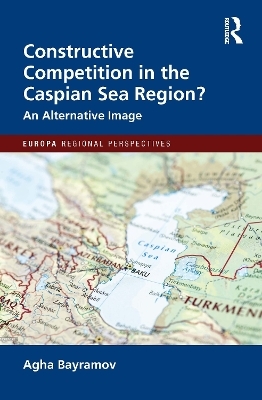
Constructive Competition in the Caspian Sea Region
Seiten
2024
Routledge (Verlag)
978-1-032-27554-3 (ISBN)
Routledge (Verlag)
978-1-032-27554-3 (ISBN)
Drawing on theoretical insights from functionalist framework, this volume examines three intertwined case studies: the Baku-Tbilisi-Ceyhan pipeline (BTC), the Southern Gas Corridor (SGC) and the Caspian Environmental Program (CEP) and portrays a new image of the Caspian Sea region.
The Caspian Sea region has hitherto largely been investigated from a `New Great Game’ perspective that depicts the region as a geopolitical battleground between regional and external great powers, where tensions have been exacerbated by the sea’s rich natural resources, strategic location, and legal disagreements over its status. This book, by contrast, portrays a new image of the region, which still acknowledges the difficulties and problematic starting situation of power politics there. It, however, seeks to show that there are ways forward by identifying mechanisms and means to transform the `New Great Game’ into processes of functional co-operation. Drawing on theoretical insights from a functionalist framework, this book examines three intertwined case studies, namely the Baku-Tbilisi-Ceyhan pipeline (BTC), the Southern Gas Corridor (SGC), and the Caspian Environmental Program (CEP). It shows that lessons learned from environmental co-operation have influenced the discussion over the uncertain legal status of the sea, which culminated in the signing in 2018 of the Convention on the legal status of the Caspian Sea. This book analyzes the three phases of the BTC and the SGC projects: the planning of the pipeline, its construction, and its use, none of which have been adequately addressed yet. This book illustrates the increasing role of actors beyond and besides the states in the Caspian Sea region, such as transnational corporations, non-governmental organizations, and intergovernment organizations.
The Caspian Sea region has hitherto largely been investigated from a `New Great Game’ perspective that depicts the region as a geopolitical battleground between regional and external great powers, where tensions have been exacerbated by the sea’s rich natural resources, strategic location, and legal disagreements over its status. This book, by contrast, portrays a new image of the region, which still acknowledges the difficulties and problematic starting situation of power politics there. It, however, seeks to show that there are ways forward by identifying mechanisms and means to transform the `New Great Game’ into processes of functional co-operation. Drawing on theoretical insights from a functionalist framework, this book examines three intertwined case studies, namely the Baku-Tbilisi-Ceyhan pipeline (BTC), the Southern Gas Corridor (SGC), and the Caspian Environmental Program (CEP). It shows that lessons learned from environmental co-operation have influenced the discussion over the uncertain legal status of the sea, which culminated in the signing in 2018 of the Convention on the legal status of the Caspian Sea. This book analyzes the three phases of the BTC and the SGC projects: the planning of the pipeline, its construction, and its use, none of which have been adequately addressed yet. This book illustrates the increasing role of actors beyond and besides the states in the Caspian Sea region, such as transnational corporations, non-governmental organizations, and intergovernment organizations.
List of Abbreviations, Tables, Figures and Maps, Acknowledgments, Introduction, Chapter 1: New Great Game In The Caspian Sea, Chapter 2: Revisiting Functionalism, Chapter 3: Environmental Issues, Conflict and Co-operation Potential for the Caspian Sea, Chapter 4: Cooperation around Post-Soviet Transnational Infrastructure Projects in the Caspian Sea, Chapter 5: A New Round in the Caspian Pipeline Game: the Southern Gas Corridor, Conclusion
| Erscheinungsdatum | 20.09.2024 |
|---|---|
| Reihe/Serie | Europa Regional Perspectives |
| Zusatzinfo | 9 Halftones, black and white; 9 Illustrations, black and white |
| Verlagsort | London |
| Sprache | englisch |
| Maße | 156 x 234 mm |
| Gewicht | 371 g |
| Themenwelt | Naturwissenschaften ► Biologie ► Ökologie / Naturschutz |
| Sozialwissenschaften ► Politik / Verwaltung ► Europäische / Internationale Politik | |
| Technik ► Umwelttechnik / Biotechnologie | |
| Wirtschaft ► Volkswirtschaftslehre ► Makroökonomie | |
| Wirtschaft ► Volkswirtschaftslehre ► Wirtschaftspolitik | |
| ISBN-10 | 1-032-27554-5 / 1032275545 |
| ISBN-13 | 978-1-032-27554-3 / 9781032275543 |
| Zustand | Neuware |
| Informationen gemäß Produktsicherheitsverordnung (GPSR) | |
| Haben Sie eine Frage zum Produkt? |
Mehr entdecken
aus dem Bereich
aus dem Bereich
Planung · Recht · Verfahren
Buch | Hardcover (2024)
Springer Vieweg (Verlag)
64,99 €
Lehrbuch zu Grundlagen, Technologie und Praxis
Buch | Hardcover (2022)
Hanser (Verlag)
34,99 €


